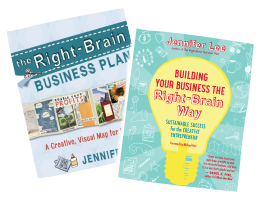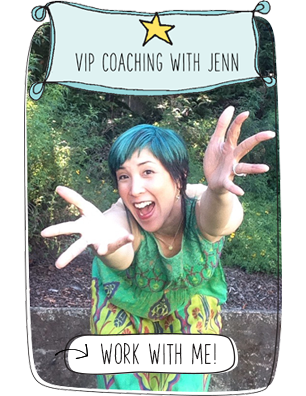 Guest post by licensed Right-Brain Business Plan® Facilitator and Associate Coach Kiala Givehand
Guest post by licensed Right-Brain Business Plan® Facilitator and Associate Coach Kiala Givehand
If you are a right-brained business owner who loves what they do, you will likely understand when I say there is both pain and pleasure in doing what you love. And if you work from home, you’ll likely agree with that sentiment even more. Most small business owners are striving to build the lives they want and that often means moving out of the traditional workforce and into entrepreneurship.
But what happens when there are days that don’t allow you to spend time creating or connecting or sharing? What does it look like when you find yourself drowning in your to-do list and feeling overwhelmed by the demands and requests from family, friends, and even from your perfect customers? By the time you get to this feeling, you might think there’s no way out. Like you don’t know where you business stops and your life begins. One surefire way to pull yourself out of this space is to make sure you are setting clear and realistic boundaries.
Boundaries can take on many forms. From setting specific work hours for yourself each day to saying no to spontaneous lunch dates and last minute requests from loved ones to “handle this” or to “take care of that.” You put boundaries in place so that you can stand firm on the values you’ve identified for yourself and for your business. The one thing that is true for most creative entrepreneurs is that we love what we do and so we could likely do it all day, every day without issue, but we still need to hold ourselves accountable to prevent burnout and overwhelm.
The first, and maybe the most important, is setting boundaries for your work day. Working from home requires a special kind of boundary setting strategy. Let’s face it, when you work from home, you never really leave the “office” — you’re always at work. So having clear boundaries around your work hours and your home hours is a good place to start.
If it helps to reframe the word “boundary” you can think of it as bookends or as a container. It’s fine to say that you value time freedom in your business, but what does that look like for you? Does that mean you work traditional hours of 9AM to 5PM? Or does that mean you get to create your own work hours that allow your work day to start at 6AM and end at 2PM with a one hour break at 9AM?
Whatever your work day looks like, it needs a container or a frame that only you can create. Once you have these hours established, you may want to post them somewhere visible to you everyday. You might set a reminder in your phone that tells you when your work day is done. Do whatever you need to do in order to have a definite end to your work day so that your life and your work don’t become one. Keep in mind that you can change your work hours as you see fit. It’s the act of setting a start and end time that will empower you.
**If setting a start and end time feels too stifling for you, try thinking about it from the other direction. Set the times that you want to play or the times that you must be available for your loved ones or other set engagements, then build your work schedule around that.
Next, boundaries can prove extremely helpful when dealing with your perfect customers. Knowing when to say no or when to walk away is just as valuable as knowing when a client isn’t the perfect fit for you and when they are.
If you run a service based business, you are likely dealing directly with your customer. That could mean you are exchanging time for money. When this is your business model, it’s really easy to give more than you are actually getting paid to give. This is common for heart-centered creatives who get joy from helping others. Here are a few ways you can set clear boundaries with your clients/customers:
- Know your boundaries. Seems simple enough, right? Well, it’s a lot harder for some than you might think. One way to know your boundaries is to write them down. What are you willing to do and what are you absolutely not willing to do? For instance, if you do not want to hold meetings via Skype, but the client insists, how will you handle it? While you cannot anticipate every possible scenario, you likely have some “deal breakers” — start with those.
- Create a contract, memorandum of understanding, or a customer agreement that clearly states your work hours, fees, what you charge for rush jobs, last minute appointments, cancellations, tasks not listed in the original agreement, etc. This sets the expectations from the very beginning.
- Don’t respond to emails outside of your stated work hours. This gives the impression that you are available any time. You might state your email response time in your customer agreement to help in this area.
Finally, setting boundaries is really important with family and friends. Often times the words “work from home” don’t properly translate for people who have worked traditional jobs or no jobs at all. They may picture you sleeping till noon every day and spending time watching television while they are busy going about their work, school, or other activities. Only you can know what feels right for you, so spend some time thinking about this and create clear boundaries that you then communicate to those closest to you.
For example, maybe you hang a special ribbon on the door knob of your office when you don’t want to be disturbed. Or maybe you have your siblings or best friends text before calling you during work hours. Whatever it looks like for you, it’s imperative that you communicate clearly what they can expect from you and of you. This can reduce a great deal of anxiety, guilt, and resentment down the road.
The bottom line is that It takes practice to set and stick to your boundaries, but once you commit to the practice, you can turn your boundaries into your best friend. Boundaries can be the things that help you embrace more ease in your day-to-day business. Which boundaries do you know you need to set but haven’t?
 Kiala Givehand, EdS, MFA, MA is the founder of Giving Hands Creative, Generations Literary Press, and HowToArtJournal.com. She has a unique perspective on what it means to be a multi-passionate business owner. As an empowerment & accountability coach for creative female entrepreneurs, introverts, writers, & artists, Kiala uses her fierce energy to help her clients identify and embrace their gifts so they can empower their lives with passion and intentional success. You can visit her on her Website. Kiala is one of our licensed Right-Brain Business Plan® Facilitators and a Right Brain Business Plan Associate Coach.
Kiala Givehand, EdS, MFA, MA is the founder of Giving Hands Creative, Generations Literary Press, and HowToArtJournal.com. She has a unique perspective on what it means to be a multi-passionate business owner. As an empowerment & accountability coach for creative female entrepreneurs, introverts, writers, & artists, Kiala uses her fierce energy to help her clients identify and embrace their gifts so they can empower their lives with passion and intentional success. You can visit her on her Website. Kiala is one of our licensed Right-Brain Business Plan® Facilitators and a Right Brain Business Plan Associate Coach.









